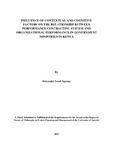| dc.description.abstract | This study sought to establish the relationship between performance in Government
Ministries in Kenya and the implementation of performance contracting (PC) system. The
study investigated the influence of contextual and cognitive factors on the relationship between
PC system and organizational performance in Government Ministries. This study was
grounded on Results Theory because the PC system in Kenya is a results oriented performance
measurement system. The research designs that guided this study were descriptive survey
design and correlational research design. The research approach in this study was mixed
methods research approach and pragmatism paradigm. Quantitative data was collected through
a self-administered structured questionnaire while qualitative data was collected through an
interview guide after the research instruments were pilot tested for validity through content
related method and reliability through test-retest criterion. A sample size of 310 respondents
was selected by use of Sekaran’s (2003) sampling size criterion from a population of 103,010
employees in Government Ministries through multi-stage sampling technique. The statistical
tools of analysis that were used for descriptive data were the arithmetic mean and the standard
deviation while the statistical tools of analysis that were used for inferential statistics were
Pearson’s Product Moment Correlation (r) and Stepwise Regression (R2). F-tests were used to
test the hypotheses in the study. Tests of statistical assumptions were carried out before data
analysis to avoid invalidation of statistical analysis. Out of the ten hypotheses tested in the
study, five were accepted while five were rejected. With r = 0.232, F (3,177) = 3.358 at p =
0.02 > 0.05, H1 was accepted and concluded that PC systems significantly influence
organizational performance. With r = 0.003, F (1,181) = 0.001 at p = 0.969 > 0.05, H1a was
rejected and it was concluded that PC targets do not significantly influence organizational
performance. With r = 0.193, F (1,181) = 6.9 at p = 0.009 > 0.05, H1b was accepted and it was
concluded that PC tools significantly influence organizational performance. With r = 0.058, F
(1,179) = 0.612 at p = 0.435 > 0.05, H1c was rejected and it was concluded that PC implementer
participation does not significantly influence organizational performance. With R2 = 0.094, F
(1,179) = 18.470 at p < 0.05, H2 was accepted and it was concluded that the strength of the
relationship between PC system and organizational performance depends on contextual factors.
With R2 = 0.057, F (2,177) = 5.315 at p = 0.006 < 0.05, H2a was rejected and it was concluded
that the strength of the relationship between PC system and organizational performance does
not depend on organizational structure. With R2 = 0.118, F (2,177) = 11.864 at p < 0.005, H2b
was accepted and it was concluded that the strength of the relationship between PC system and
organizational performance depends on organizational culture. With R2 = 0.033, F (1,179) =
6.074 at p = 0.015 < 0.05, H3 was rejected and it was concluded that the strength of the
relationship between PC system and organizational performance does not depend on cognitive
factors. With R2 = 0.033, F (1,179) = 6.074 at p = 0.015 < 0.05 H3a was rejected and it was
concluded that the strength of the relationship between PC system and organizational
performance does not depend on implementer attitude. With R2 = 0.140, F (2,177) = 9.588 at
p < 0.05, H3b was accepted and it was concluded that the strength of the relationship between
PC system and organizational performance depends on implementer Monitoring and
Evaluation (M&E) skills. It was recommended that performance measurement systems in
Government Ministries should be synchronized through an integrated M&E system. In
addition, the PC system should be contextualized per Government Ministry and anchored
through parliamentary legislation to safeguard related gains from future political manipulation.
It was also recommended that the simplicity, validity and reliability of PC tools should be
enhanced and PC implementers equipped with M&E skills. Since this study delimited itself to
the PC system, further research can be carried to investigate the influence of NIMES,
EPROMIS and Vision 2030 on organizational performance in Government Ministries in
Kenya. | en_US |



